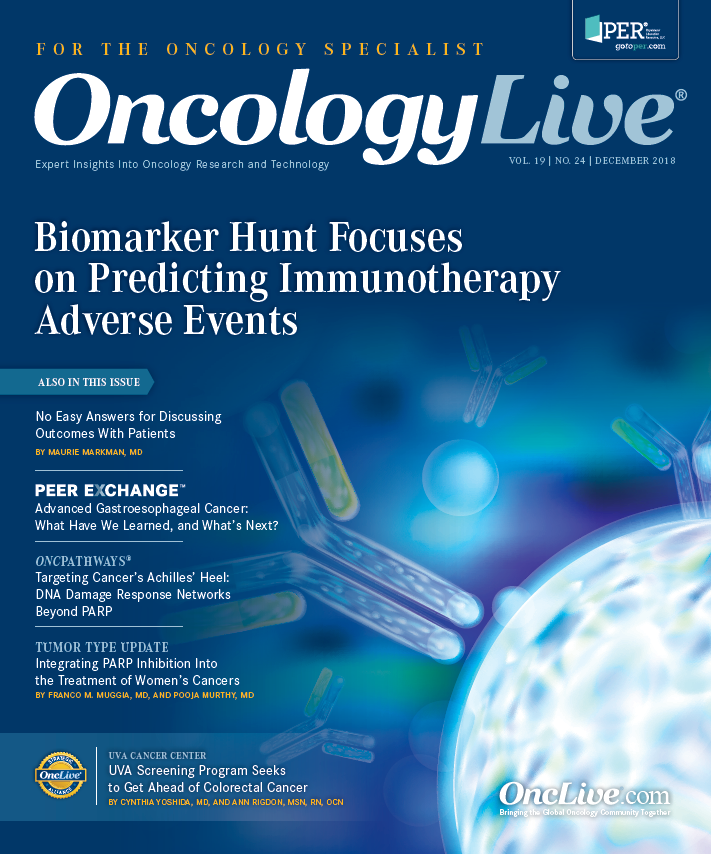Tucatinib Shows Promise in Patients With Breast Cancer and Brain Metastases
Evidence continues to build that tucatinib, a novel small molecule HER2 inhibitor, is safe and effective for patients with advanced HER2-positive breast cancer in combination with standard therapies, including for those who develop brain metastases.

Nancy U. Lin, MD
Evidence continues to build that tucatinib, a novel small molecule HER2 inhibitor, is safe and effective for patients with advanced HER2-positive breast cancer in combination with standard therapies, including for those who develop brain metastases from their primary disease. There are currently no systemic therapies that the FDA has specifically approved for this population, even though brain metastases are prevalent in the malignancy.1
Tucatinib is being explored in combination with trastuzumab (Herceptin), which also targets HER2, plus capecitabine in patients with previously treated unresectable locally advanced or metastatic HER2- positive breast cancer in the HER2CLIMB trial (NCT02614794). The study is open to patients regardless of central nervous system (CNS) involvement. This includes patients without evidence of brain metastases and those with untreated or previously treated lesions who are not in need of immediate local therapy.
The triplet regimen was associated with a 42% CNS response rate among patients with brain metastases during a small phase I study, Nancy U. Lin, MD, said during a presentation at the 2018 San Antonio Breast Cancer Symposium (SABCS).1,2 Lin is the principal investigator for HER2CLIMB at Dana-Farber Cancer Institute in Boston, Massachusetts, where she is clinical director of the Breast Oncology Center at the Susan F. Smith Center for Women’s Cancers and director of the Metastatic Breast Cancer Program.
Investigators have recruited approximately 350 patients into HER2CLIMB, Lin told OncologyLive® in an email. The trial is enrolling patients previously treated with trastuzumab, pertuzumab (Perjeta), and ado-trastuzumab emtansine (T-DM1; Kadcyla). Progression-free survival (PFS) is the primary endpoint (Figure).
Figure. Tucatinib Triplet in HER2-Positive Metastatic Breast Cancer
Study Findings for Triplet Therapy
Brain metastases are prevalent among patients with several breast cancer subtypes, Lin noted in the abstract of her SABCS presentation. In the metastatic setting, lesions can occur in up to 50% of patients with HER2-positive disease, 25% to 45% of those with triple-negative breast cancer, and 10% to 15% of those with estrogen receptor—positive disease, she said. Although surgery and radiotherapy may be options for local therapy, Lin said they are associated with toxicities.1 In prior research, Lin has discussed evolving approaches for treating patients with breast cancer and CNS involvement. “Targeting HER2 appears to be a viable strategy for the treatment of brain metastases,” Lin said during a presentation at the 2017 American Society of Clinical Oncology Annual Meeting.3In May, investigators reported findings from a nonrandomized phase IB study in which patients were assigned to various cohorts testing doublets consisting of tucatinib with either capecitabine or trastuzumab and a triplet containing tucatinib plus capecitabine and trastuzumab. The primary objective was to determine the maximum-tolerated dose and the recommended phase II dose of tucatinib, which was established at the recommended phase II dose of 300 mg twice daily.4
Overall, 60 patients enrolled at 5 sites and were treated during the study. Among 44 patients treated with the recommended phase II dose, the objective response rate was 83% (5 of 6) in patients with measurable disease treated with tucatinib plus capecitabine, 40% (6 of 15) in those who received tucatinib/trastuzumab, and 61% (14 of 23) in participants treated with the combination of all 3 drugs. Notably, the median duration of response was longer in those treated with triplet therapy: 11.0 months (range, 2.9-18.6) with the triplet compared with 5.2 months (range, 2.1-7.6) in the tucatinib/ capecitabine arm and 8.9 months (range, 1.4-8.9) in the tucatinib/trastuzumab group.
In all, 27 patients received tucatinib-containing triplet therapy at the recommended phase II dose, including 16 without brain metastases and 11 with brain tumors. Among these patients, the median PFS was 7.8 months (4.1-12.5) for the entire group, 9.2 months (95% CI, 4.1-19.1) for those without brain metastases, and 6.7 months (95% CI, 1.4-12.5) for those with lesions.
In terms of adverse events (AEs), the most frequently reported AEs of grade 1/2 severity in >10% of participants who received tucatinib at the recommended dose as part of the triplet regimen were diarrhea in 9 patients (33%), nausea in 7 (26%), and fatigue in 4 (15%). The most frequently reported grade 3 AEs were fatigue and aspartate aminotransferase level increase in 2 patients each (7% each). There was 1 dose-limiting toxicity in this group: a grade 4 instance of cerebral edema in a patient with an untreated brain metastasis who had not received corticosteroids. The toxicity was quickly resolved after corticosteroids were administered, investigators said.
In earlier phase I findings evaluating the triplet combination, 61% of patients with measurable disease had an objective response. The objective response rate was 42% for the 12 patients who had brain metastases at baseline. Lin, who was a coauthor on the study, said these results suggest that the combination of chemotherapy and HER2-directed therapy improves response rates.2
“These data form the basis of the ongoing randomized trial HER2CLIMB. The trial enrolls patients with HER2-positive metastatic breast cancer and, unlike nearly all randomized trials to date in breast cancer, is agnostic with respect to patients with brain metastases,” she added. “So patients are eligible if they have no brain metastases, treated stable brain metastases, or active brain metastases. And the randomization is to the triplet or to the doublet of trastuzumab chemotherapy alone.”
References
- Lin N. Systemic therapy for breast cancer brain metastases. Presented at: 2018 San Antonio Breast Cancer Symposium; December 4-8, 2018; San Antonio, TX. Abstract ES3-3. abstracts2view.com/sabcs18/view.php?nu=SABCS18L_9056INV&terms=
- Hamilton E, Borges VF, Conlin A, et al. Efficacy results of a phase 1b study of tucatinib (ONT-380), an oral HER2-specific inhibitor, in combination with capecitabine and trastuzumab in HER2+ metastatic breast cancer, including patients with brain metastases. Presented at: 2016 San Antonio Breast Cancer Symposium; December 6-10, 2016. San Antonio, TX. Poster P4-21-01. sabcs16.posterview.com/nosl/i/P4-21-01.
- Lin N. Breast cancer in the central nervous system: multidisciplinary considerations and management. Presented at: 2017 American Society of Clinical Oncology Annual Meeting; June 2-6, 2017; Chicago, IL. meetinglibrary.asco.org/record/138228/video.
- Murthy R, Borges VF, Conlin A, et al. Tucatinib with capecitabine and trastuzumab in advanced HER2-positive metastatic breast cancer with and without brain metastases: a non-randomised, open-label, phase 1b study. Lancet Oncol. 2018;19(7):880-888. doi: 10.1016/ S1470-2045(18)30256-0.




